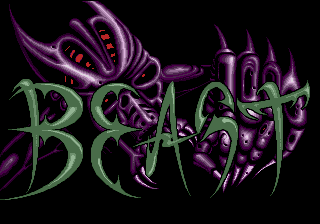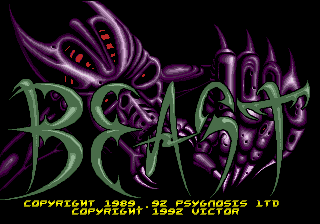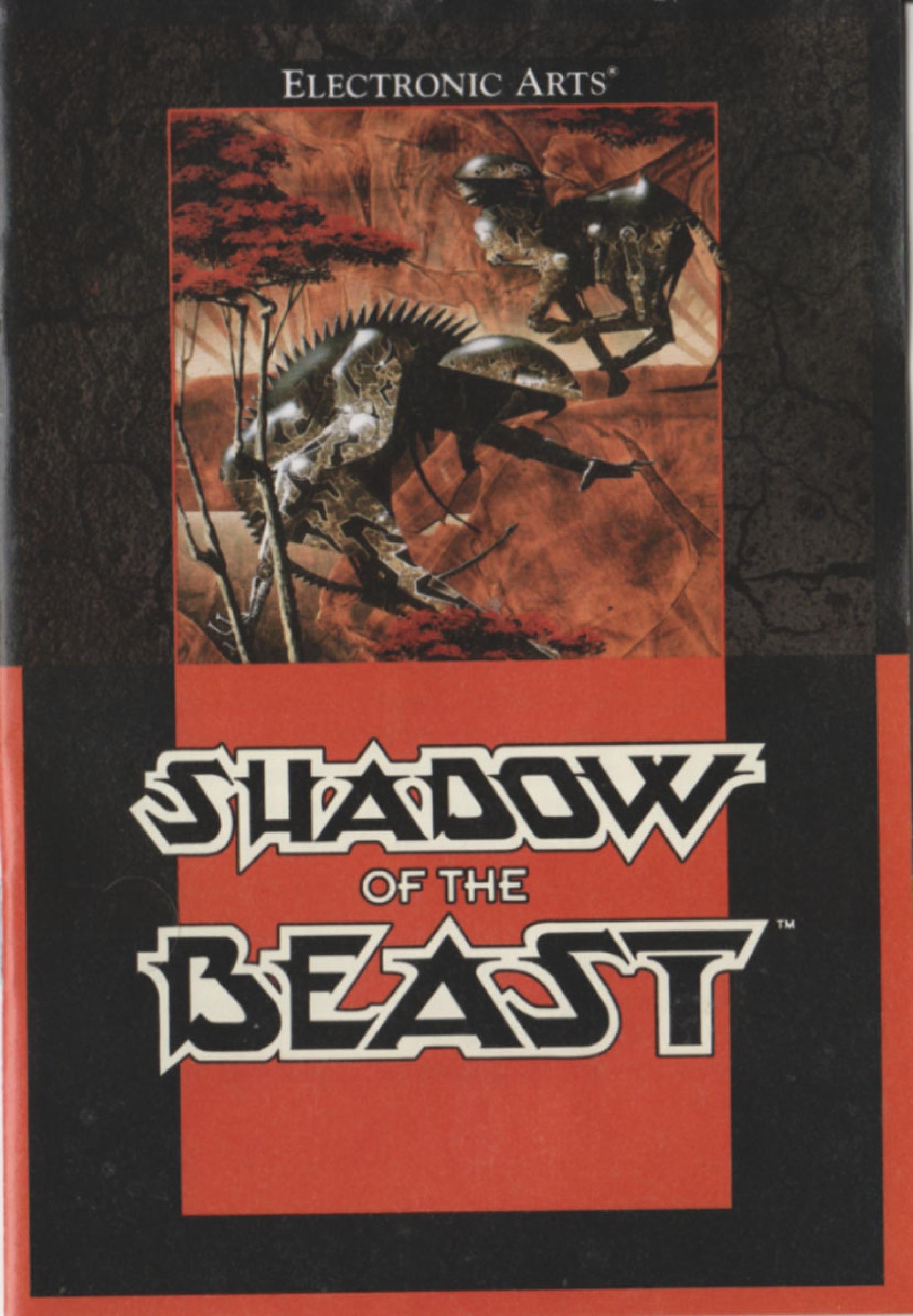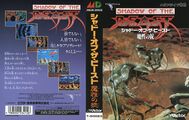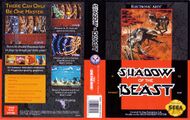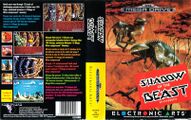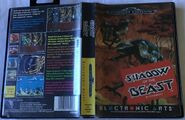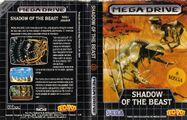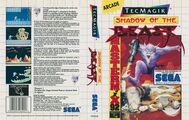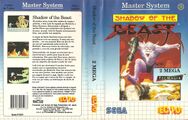Difference between revisions of "Shadow of the Beast"
From Sega Retro
Bonus Game (talk | contribs) |
|||
| (14 intermediate revisions by 6 users not shown) | |||
| Line 1: | Line 1: | ||
| + | {{cleanup|The bazooka graphics glitch needs verifying in both the Japanese and Western Mega Drive versions and moved to [[Shadow of the Beast/Bugs]].}} | ||
{{Bob | {{Bob | ||
| bobscreen=SotB Title.png | | bobscreen=SotB Title.png | ||
| Line 13: | Line 14: | ||
{{company|[[TecMagik]]|system=SMS}} | {{company|[[TecMagik]]|system=SMS}} | ||
| licensor=[[Psygnosis]] | | licensor=[[Psygnosis]] | ||
| + | | distributor={{company|[[Tec Toy]]|region=BR}} | ||
| + | {{company|[[Electronic Arts]]|region=AU|system=SMS}} | ||
| + | {{company|[[Electronic Arts Africa]]|region=ZA|system=MD}} | ||
| system=[[Sega Mega Drive]], [[Sega Master System]] | | system=[[Sega Mega Drive]], [[Sega Master System]] | ||
| sounddriver={{MD}} [[Sound Images v1.0]] | | sounddriver={{MD}} [[Sound Images v1.0]] | ||
| Line 29: | Line 33: | ||
| md_date_eu=1991-11{{magref|segapower|25|11}} | | md_date_eu=1991-11{{magref|segapower|25|11}} | ||
| md_code_eu=E195SMXI | | md_code_eu=E195SMXI | ||
| − | | md_date_pt= | + | | md_date_pt=199x |
| − | | md_code_pt= | + | | md_code_pt=MDJ0023 |
| − | | md_date_uk=1991-11{{magref|segapower|25|11}} | + | | md_date_uk=1991-12-12{{magref|segapro|3|7}}{{magref|ctw|366|27}}<!--1991-11{{magref|segapower|25|11}}--> |
| md_code_uk=E195SMXI | | md_code_uk=E195SMXI | ||
| md_rrp_uk=39.99{{magref|segapower|27|33}}<!--44.99{{magref|gz|3|23}}--> | | md_rrp_uk=39.99{{magref|segapower|27|33}}<!--44.99{{magref|gz|3|23}}--> | ||
| md_date_au=199x | | md_date_au=199x | ||
| md_date_br=199x | | md_date_br=199x | ||
| + | | md_date_cz=199x | ||
| + | | md_date_za=199x | ||
}} | }} | ||
{{releasesSMS | {{releasesSMS | ||
| sms_date_eu=1991-11-21{{magref|segapro|1|9}}<!--1992-01{{magref|gz|3|22}}--> | | sms_date_eu=1991-11-21{{magref|segapro|1|9}}<!--1992-01{{magref|gz|3|22}}--> | ||
| sms_code_eu=27019-50 | | sms_code_eu=27019-50 | ||
| − | | sms_date_uk=1991-11-21{{magref|segapro|1|9}} | + | | sms_date_uk=1992-02{{magref|ctw|373|17}}<!--1991-11-21{{magref|segapro|1|9}}, 1992-01{{magref|gz|3|22}}{{magref|segapro|4|7}}--> |
| sms_code_uk=27019-50 | | sms_code_uk=27019-50 | ||
| sms_rrp_uk=34.99{{magref|cvg|121|100}}<!--29.99{{magref|segapower|26|48}}--> | | sms_rrp_uk=34.99{{magref|cvg|121|100}}<!--29.99{{magref|segapower|26|48}}--> | ||
| Line 55: | Line 61: | ||
==Gameplay== | ==Gameplay== | ||
| − | {{A}} and {{C}} jump. {{B}} performs attacks, pressing it while in midair performs a jumpkick. The player has 12 hit points. Losing all of them (gradually or through instant kill attacks/traps) restarts the game as there | + | {{A}} and {{C}} jump. {{B}} performs attacks, pressing it while in midair performs a jumpkick. The player has 12 hit points. Losing all of them (gradually or through instant kill attacks/traps) restarts the game as there is no lives system. A bazooka-like weapon can be found later on. A short flying section also exists. The hit detection is very strict; often, the player will run into situations were damage is basically unavoidable, or it's more convenient to take a hit on purpose and use the resulting invincibility to avoid further damage by running away. |
The game was a baby step into the realm of non-linear game design, as stages can be at least partially explored and re-explored without having all key items. A fixed set of objectives needs to be performed to play the game in full, however. | The game was a baby step into the realm of non-linear game design, as stages can be at least partially explored and re-explored without having all key items. A fixed set of objectives needs to be performed to play the game in full, however. | ||
| Line 64: | Line 70: | ||
The Amiga version was considered impressive for its time with atmospheric soundtrack and graphics, which had multiple scrolling planes, color usage and diverse graphics, however the [[Sega Mega Drive]] was scaled back, with some enemies missing or their positions being altered. | The Amiga version was considered impressive for its time with atmospheric soundtrack and graphics, which had multiple scrolling planes, color usage and diverse graphics, however the [[Sega Mega Drive]] was scaled back, with some enemies missing or their positions being altered. | ||
| − | The Mega Drive game was not optimised for | + | The Mega Drive game was not optimised for NTSC machines, and thus runs too fast. This was corrected in the Japanese release, which also makes adjustments to the graphics, adds a proper ending sequence and includes a much-needed additional healing item in a later stage. The changes were reportedly made at the request of Japanese publisher [[Victor Musical Industries]]. |
The Master System version is even more scaled back from the Mega Drive port. Most of the interior background art is removed and replaced with simplified dark or blue backgrounds. It has no cutscenes like the ones seen in 16-bit ports and instead they are replaced with black and white text. | The Master System version is even more scaled back from the Mega Drive port. Most of the interior background art is removed and replaced with simplified dark or blue backgrounds. It has no cutscenes like the ones seen in 16-bit ports and instead they are replaced with black and white text. | ||
| − | The developers of the Master System version somehow felt the need to introduce an inventory system to the game. In every other version, power-ups and other items are instantly used while in the Master System port, they are added to an inventory, which is accessible by pressing the {{2}} button. While this can be considered a benefical update, as it allows players to stock up and use items later, the inventory can only carry 7 items at a time, and the game gives no indication about the | + | The developers of the Master System version somehow felt the need to introduce an inventory system to the game. In every other version, power-ups and other items are instantly used while in the Master System port, they are added to an inventory, which is accessible by pressing the {{2}} button. While this can be considered a benefical update, as it allows players to stock up and use items later, the inventory can only carry 7 items at a time, and the game gives no indication about the items in the player's possession; not even the manual explains what these items do and the only way to find out their effects is to use them, which may result in players wasting a precious quest item and potentially render the game unwinnable as used quest items do not return. In the original game, all common and important items are used immediately after picking up. Using {{2}} as an inventory screen also forces players to press {{Up}} on the D-Pad to jump, which is not the best button configuration for a side-scrolling platforming game. Why the developers decided to make this change is unknown. |
The Master System version also announces a boss every time one appears, making this the only port of the game in which names of the bosses can be seen in-game. | The Master System version also announces a boss every time one appears, making this the only port of the game in which names of the bosses can be seen in-game. | ||
| Line 140: | Line 146: | ||
| region=PT | | region=PT | ||
| cover= | | cover= | ||
| − | | cart= | + | | cart=SotB MD US Cart.jpg |
| − | | manual= | + | | manual=SotB MD PT manual.jpg |
}} | }} | ||
{{Scanbox | {{Scanbox | ||
| Line 164: | Line 170: | ||
| region=ZA/KE/LS/MZ/NA/BW/SZ/ZW | | region=ZA/KE/LS/MZ/NA/BW/SZ/ZW | ||
| front=SotB MD ZA KE LS MZ NA BW SZ ZW box front.jpg | | front=SotB MD ZA KE LS MZ NA BW SZ ZW box front.jpg | ||
| + | | spinemissing=yes | ||
| back=SotB MD ZA KE LS MZ NA BW SZ ZW box back.jpg | | back=SotB MD ZA KE LS MZ NA BW SZ ZW box back.jpg | ||
| cart=SotB MD US Cart.jpg | | cart=SotB MD US Cart.jpg | ||
Latest revision as of 14:21, 24 October 2024
| This article needs cleanup. This article needs to be edited to conform to a higher standard of article quality. After the article has been cleaned up, you may remove this message. For help, see the How to Edit a Page article. Further information: The bazooka graphics glitch needs verifying in both the Japanese and Western Mega Drive versions and moved to Shadow of the Beast/Bugs. |
| Shadow of the Beast | ||||||||||||||||||||||||||||||||||||||||||||||||||||||||||||||||||||||
|---|---|---|---|---|---|---|---|---|---|---|---|---|---|---|---|---|---|---|---|---|---|---|---|---|---|---|---|---|---|---|---|---|---|---|---|---|---|---|---|---|---|---|---|---|---|---|---|---|---|---|---|---|---|---|---|---|---|---|---|---|---|---|---|---|---|---|---|---|---|---|
| System(s): Sega Mega Drive, Sega Master System | ||||||||||||||||||||||||||||||||||||||||||||||||||||||||||||||||||||||
| Publisher: Electronic Arts (US/EU) Victor Musical Industries (JP) TecMagik | ||||||||||||||||||||||||||||||||||||||||||||||||||||||||||||||||||||||
| Developer: Reflections Interactive, Psygnosis WJS Design TecMagik | ||||||||||||||||||||||||||||||||||||||||||||||||||||||||||||||||||||||
| Distributor: Tec Toy (BR) Electronic Arts (AU) Electronic Arts Africa (ZA) | ||||||||||||||||||||||||||||||||||||||||||||||||||||||||||||||||||||||
| Licensor: Psygnosis | ||||||||||||||||||||||||||||||||||||||||||||||||||||||||||||||||||||||
| Original system(s): Amiga | ||||||||||||||||||||||||||||||||||||||||||||||||||||||||||||||||||||||
| Developer(s) of original games: Reflections Interactive | ||||||||||||||||||||||||||||||||||||||||||||||||||||||||||||||||||||||
| Sound driver: Sound Images v1.0 | ||||||||||||||||||||||||||||||||||||||||||||||||||||||||||||||||||||||
| Genre: Action[1], Arcade[2] | ||||||||||||||||||||||||||||||||||||||||||||||||||||||||||||||||||||||
| Number of players: 1 | ||||||||||||||||||||||||||||||||||||||||||||||||||||||||||||||||||||||
| ||||||||||||||||||||||||||||||||||||||||||||||||||||||||||||||||||||||
|
This short article is in need of work. You can help Sega Retro by adding to it.
Shadow of the Beast, known as Shadow of the Beast: Mashou no Okite (シャドー・オブ・ザ・ビースト 魔性の掟) in Japan, is an action game developed by Reflections Interactive for the Amiga and published by Psygnosis. It was brought to a variety of systems including the Sega Mega Drive and Sega Master System in 1991 and 1992 respectively. It was followed by Shadow of the Beast II and the Amiga-exclusive Shadow of the Beast III.
Contents
Story
The player controls the Beast Messenger. Born a human child and kidnapped at a young age by mages who serve the Beast Lord, the Beast Messenger was transformed into a monster and had all his memories wiped to enter a lifetime of servitude. However, suddenly, all his memories return to him, and he now seeks revenge and to escape.
Gameplay
![]() and
and ![]() jump.
jump. ![]() performs attacks, pressing it while in midair performs a jumpkick. The player has 12 hit points. Losing all of them (gradually or through instant kill attacks/traps) restarts the game as there is no lives system. A bazooka-like weapon can be found later on. A short flying section also exists. The hit detection is very strict; often, the player will run into situations were damage is basically unavoidable, or it's more convenient to take a hit on purpose and use the resulting invincibility to avoid further damage by running away.
performs attacks, pressing it while in midair performs a jumpkick. The player has 12 hit points. Losing all of them (gradually or through instant kill attacks/traps) restarts the game as there is no lives system. A bazooka-like weapon can be found later on. A short flying section also exists. The hit detection is very strict; often, the player will run into situations were damage is basically unavoidable, or it's more convenient to take a hit on purpose and use the resulting invincibility to avoid further damage by running away.
The game was a baby step into the realm of non-linear game design, as stages can be at least partially explored and re-explored without having all key items. A fixed set of objectives needs to be performed to play the game in full, however.
After collecting the bazooka, the game's graphics can glitch when dying or after leaving the castle. (TODO: Confirm this also happens in the Japanese version)
Versions
The Amiga version was considered impressive for its time with atmospheric soundtrack and graphics, which had multiple scrolling planes, color usage and diverse graphics, however the Sega Mega Drive was scaled back, with some enemies missing or their positions being altered.
The Mega Drive game was not optimised for NTSC machines, and thus runs too fast. This was corrected in the Japanese release, which also makes adjustments to the graphics, adds a proper ending sequence and includes a much-needed additional healing item in a later stage. The changes were reportedly made at the request of Japanese publisher Victor Musical Industries.
The Master System version is even more scaled back from the Mega Drive port. Most of the interior background art is removed and replaced with simplified dark or blue backgrounds. It has no cutscenes like the ones seen in 16-bit ports and instead they are replaced with black and white text.
The developers of the Master System version somehow felt the need to introduce an inventory system to the game. In every other version, power-ups and other items are instantly used while in the Master System port, they are added to an inventory, which is accessible by pressing the ![]() button. While this can be considered a benefical update, as it allows players to stock up and use items later, the inventory can only carry 7 items at a time, and the game gives no indication about the items in the player's possession; not even the manual explains what these items do and the only way to find out their effects is to use them, which may result in players wasting a precious quest item and potentially render the game unwinnable as used quest items do not return. In the original game, all common and important items are used immediately after picking up. Using
button. While this can be considered a benefical update, as it allows players to stock up and use items later, the inventory can only carry 7 items at a time, and the game gives no indication about the items in the player's possession; not even the manual explains what these items do and the only way to find out their effects is to use them, which may result in players wasting a precious quest item and potentially render the game unwinnable as used quest items do not return. In the original game, all common and important items are used immediately after picking up. Using ![]() as an inventory screen also forces players to press
as an inventory screen also forces players to press ![]() on the D-Pad to jump, which is not the best button configuration for a side-scrolling platforming game. Why the developers decided to make this change is unknown.
on the D-Pad to jump, which is not the best button configuration for a side-scrolling platforming game. Why the developers decided to make this change is unknown.
The Master System version also announces a boss every time one appears, making this the only port of the game in which names of the bosses can be seen in-game.
Localised names
| Language | Localised Name | English Translation |
|---|---|---|
| English | Shadow of the Beast | Shadow of the Beast |
| English (US) | Shadow of the Beast | Shadow of the Beast |
| Japanese | シャドー・オブ・ザ・ビースト 魔性の掟 | Shadow of the Beast: Mashou no Okite |
Production credits
- Design and Programming: Martin Edmondson, Paul Howarth
- Art: Reflections
- Producer: Keith Francart
- Technical Director: Steve Hayes
- Sounds and Music: David Whittaker
- Product Management: Chip Lange
- Package Design: Lance Anderson
- Cover Illustration: Roger Dean
- Documentation: Marti McKenna
- Documentation Layout: Chandler Briggs
- Manual Illustration: Adrian Bourne
- Testing: Jon Medek
- Quality Assurance: Jonathan Skolnick
Magazine articles
- Main article: Shadow of the Beast/Magazine articles.
Promotional material
- Main article: Shadow of the Beast/Promotional material.
Artwork
Physical scans
Mega Drive version
| 66 | |
|---|---|
| Based on 40 reviews | |
| Mega Drive, CZ (Datart) |
|---|
|
Master System version
| Sega Retro Average | |||||||||||||||||||||||||||||||||||||||||||||||||||||||||||||||||||||||||||||||||||||||||||||||||||||||||||||||||||||||||||||||||
|---|---|---|---|---|---|---|---|---|---|---|---|---|---|---|---|---|---|---|---|---|---|---|---|---|---|---|---|---|---|---|---|---|---|---|---|---|---|---|---|---|---|---|---|---|---|---|---|---|---|---|---|---|---|---|---|---|---|---|---|---|---|---|---|---|---|---|---|---|---|---|---|---|---|---|---|---|---|---|---|---|---|---|---|---|---|---|---|---|---|---|---|---|---|---|---|---|---|---|---|---|---|---|---|---|---|---|---|---|---|---|---|---|---|---|---|---|---|---|---|---|---|---|---|---|---|---|---|---|---|
|
| 84 | |
|---|---|
| Based on 25 reviews | |
Technical information
- Main article: Shadow of the Beast/Technical information.
References
NEC Retro has more information related to Shadow of the Beast
|
- ↑ 1.0 1.1 https://sega.jp/history/hard/megadrive/software_l.html (Wayback Machine: 2020-07-02 23:21)
- ↑ File:SotB SMS EU Box.jpg
- ↑ Beep! MegaDrive, "March 1992" (JP; 1992-02-08), page 10
- ↑ 4.0 4.1 Sega Pro, "November 1991" (UK; 1991-xx-xx), page 9
- ↑ 5.0 5.1 VideoGames & Computer Entertainment, "December 1991" (US; 1991-1x-xx), page 54
- ↑ Sega Power, "December 1991" (UK; 1991-10-30), page 11
- ↑ Sega Pro, "Christmas 1991" (UK; 1991-12-12), page 7
- ↑ Computer Trade Weekly, "" (UK; 1991-12-09), page 27
- ↑ Sega Power, "February 1992" (UK; 1992-01-02), page 33
- ↑ Computer Trade Weekly, "" (UK; 1992-02-10), page 17
- ↑ 11.0 11.1 Computer & Video Games, "December 1991" (UK; 1991-11-15), page 100
- ↑ File:Shadow Of The Beast MD US Manual.pdf, page 5
- ↑ 1700 igr dlya Sega, "" (RU; 2001-xx-xx), page 203
- ↑ Aktueller Software Markt, "Februar 1992" (DE; 1992-01-10), page 128
- ↑ Beep! MegaDrive, "April 1992" (JP; 1992-03-07), page 37
- ↑ Consoles +, "Janvier 1992" (FR; 199x-xx-xx), page 50
- ↑ Console XS, "June/July 1992" (UK; 1992-04-23), page 133
- ↑ Entsiklopediya luchshikh igr Sega. Vypusk 7, "" (RU; 2001-xx-xx), page 250
- ↑ Mean Machines: The Essential Sega Guide, "" (UK; 1993-11-18), page 87
- ↑ GamePro, "November 1991" (US; 1991-xx-xx), page 52
- ↑ Gamers, "Februar/März 1992" (DE; 1992-xx-xx), page 33
- ↑ Games-X, "21st-27th November 1991" (UK; 1991-11-21), page 34
- ↑ Génération 4, "Janvier 1992" (FR; 199x-xx-xx), page 138
- ↑ Game Zone, "January 1992" (UK; 1991-12-18), page 23
- ↑ Hippon Super, "April 1992" (JP; 1992-03-04), page 85
- ↑ 26.0 26.1 Hobby Consolas, "Febrero 1992" (ES; 1992-0x-xx), page 40
- ↑ Joypad, "Janvier 1992" (FR; 1991-12-1x), page 92
- ↑ Joystick, "Décembre 1991" (FR; 1991-1x-xx), page 182
- ↑ Sega Mega Drive Advanced Gaming, "January 1993" (UK; 199x-xx-xx), page 94
- ↑ Mega Drive Fan, "June 1992" (JP; 1992-05-08), page 83
- ↑ Mega, "June 1993" (UK; 1993-05-20), page 21
- ↑ Mega Force, "Novembre 1991" (FR; 1991-11-19), page 93
- ↑ Mega Fun, "11/92" (DE; 1992-10-xx), page 42
- ↑ MegaTech, "Xmas 1991" (UK; 1991-12-06), page 50
- ↑ Micromanía (segunda época), "Febrero 1992" (ES; 1992-0x-xx), page 31
- ↑ Micro News, "Décembre 1991" (FR; 1991-1x-xx), page 204
- ↑ Mean Machines, "December 1991" (UK; 1991-11-28), page 122
- ↑ Mean Machines Sega, "October 1992" (UK; 1992-09-xx), page 140
- ↑ Megazone, "April/May 1992" (AU; 1992-0x-xx), page 41
- ↑ Player One, "Décembre 1991" (FR; 1991-xx-xx), page 62
- ↑ Play Time, "3/92" (DE; 1992-02-05), page 87
- ↑ Power Play, "2/92" (DE; 1992-01-xx), page 167
- ↑ Sega Power, "February 1992" (UK; 1992-01-02), page 32
- ↑ Sega Pro, "Christmas 1991" (UK; 1991-12-12), page 71
- ↑ Sega Pro, "April 1993" (UK; 1993-03-11), page 67
- ↑ Sega Force Mega, "August 1993" (UK; 1993-06-24), page 89
- ↑ 47.0 47.1 Sega Force, "January 1992" (UK; 1991-12-12), page 30
- ↑ Sega Saturn Magazine, "September 1995" (JP; 1995-08-08), page 87
- ↑ Tilt, "Décembre 1991" (FR; 1991-1x-xx), page 46
- ↑ Tricks 16 bit, "Tricks Sega Gold 800 igr" (RU; 1998-03-20), page 154
- ↑ Video Games, "1/92" (DE; 1992-02-03), page 30
- ↑ Consoles +, "Octobre 1991" (FR; 1991-10-05), page 114
- ↑ Console XS, "June/July 1992" (UK; 1992-04-23), page 144
- ↑ Mean Machines: The Essential Sega Guide, "" (UK; 1993-11-18), page 154
- ↑ Game Power, "Gennaio 1992" (IT; 199x-xx-xx), page 40
- ↑ Games-X, "27th February-4th March 1992" (UK; 1992-02-27), page 24
- ↑ Game Zone, "January 1992" (UK; 1991-12-18), page 21
- ↑ Joypad, "Novembre 1991" (FR; 1991-10-1x), page 104
- ↑ Joystick, "Novembre 1991" (FR; 1991-1x-xx), page 148
- ↑ Mega Force, "Novembre 1991" (FR; 1991-11-19), page 73
- ↑ Mega Force, "Mai 1992" (FR; 1992-05-05), page 70
- ↑ Mega Force, "Mayo 1992" (ES; 1992-xx-xx), page 74
- ↑ Micromanía (segunda época), "Octubre 1992" (ES; 1992-xx-xx), page 85
- ↑ Mean Machines, "November 1991" (UK; 1991-10-29), page 74
- ↑ Mean Machines Sega, "October 1992" (UK; 1992-09-xx), page 136
- ↑ Player One, "Avril 1992" (FR; 1992-04-10), page 93
- ↑ Play Time, "7/92" (DE; 1992-06-03), page 95
- ↑ Sega Power, "January 1992" (UK; 1991-12-05), page 48
- ↑ Sega Pro, "November 1991" (UK; 1991-xx-xx), page 48
- ↑ Sega Pro, "April 1992" (UK; 1992-03-19), page 28
- ↑ Sega Pro, "April 1993" (UK; 1993-03-11), page 72
- ↑ Supersonic, "Mai/Juin 1992" (FR; 1992-xx-xx), page 20
- ↑ Video Games, "4/91" (DE; 1991-12-06), page 39
| Shadow of the Beast | |
|---|---|
|
Main page | Comparisons | Maps | Hidden content | Magazine articles | Video coverage | Reception | Promotional material | Region coding | Technical information | Bootlegs | |
- Cleanup
- 1 player games
- JP Mega Drive games
- All JP games
- US Mega Drive games
- All US games
- EU Mega Drive games
- All EU games
- PT Mega Drive games
- All PT games
- UK Mega Drive games
- All UK games
- CZ Mega Drive games
- All CZ games
- AU Mega Drive games
- All AU games
- BR Mega Drive games
- All BR games
- ZA Mega Drive games
- All ZA games
- Mega Drive games
- 1991 Mega Drive games
- All 1991 games
- Mega Drive action games
- All action games
- EU Master System games
- UK Master System games
- AU Master System games
- BR Master System games
- Master System games
- 1991 Master System games
- Master System action games
- All games
- Stubs
- Bad translation
- Shadow of the Beast
